Voices from Spain's unemployed millions
- Published
What does the economic crisis in Spain mean for ordinary people?
Last week it was announced that unemployment had reached a record high - more than six million. The government forecast that the economy would shrink another 1.3% this year - worse than expected.
People in Spain tell the BBC how they have been affected by the lack of job opportunities.
Laura Sanz, Madrid
"I am 35 years old. Since childhood, my parents have worked hard to give me the opportunities they never had because they grew up in a country impoverished after war and dictatorship.

I was taught that my efforts would allow me to have a better life than they had, but the reality is very different. I studied at university, working at the same time, then I studied for higher diplomas to complement my degree, and for some time I emigrated to the UK and Ireland for the sole purpose of learning English, which is necessary to get almost any job.
Now I can say that the efforts of our parents and most qualified young people like me have been for nothing, because our country refuses to give us a chance. I'm surrounded by people in the same situation: almost all my friends and family between the ages of 25 and 40 are unemployed and [have a] general feeling of disillusionment, disappointment, frustration...
We feel ashamed to see how our parents - of retirement age - go every day to work while we remain idle at home (against our will!)."
Tomas Rivas, Malaga, leaving Spain
"Since last October I have been unemployed. I am 31 years old and I would describe my educational path as excellent, especially at university, where I got a degree and a Master's in management and planning of tourism.
I live in Malaga, which is the main tourist city of Spain. I also studied to be a higher technician in computer systems management. But there are no job opportunities for me, either in Malaga or in the whole of Spain.
This situation is really depressed for young people like me, who have studied very hard for several years.
So I am moving to another country in Europe, where an important hotel chain has selected me for an internship programme in one of their hotels.
On the one hand, it is a sad decision because my family, girlfriend and many friends are here. But on the other hand, I know I have to take this new challenge as a great opportunity for the future, so I believe that I will come back when things get better."
Angel Moran and Conchi Leganes, Madrid
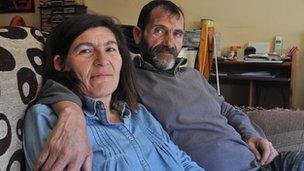
Angel Moran is 53 and has been out of work now for five years. His wife, Conchi, is 48 and has been unemployed for four. Their home is one of 1.9 million in Spain in which no-one has a job, according to the latest unemployment figures.
They receive state benefits of 426 euros (£358) a month and rely on food handouts from the Red Cross.
"Our gas has been cut off and we can hardly pay the water. After paying the rent, there's nothing left for food."
Their daughter Noelia is 26 and she is also unemployed. Her 25-year-old boyfriend also lives in the house and he is also unemployed.
"I can't get my own place with my boyfriend," she says. "I can't afford to have kids. And you just have to think about every cent you spend."
Veronica Salgado, gone back home to Venezuela
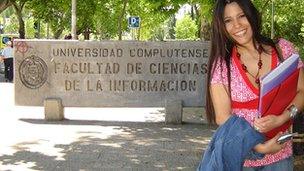
Veronica, who has recently returned to Venezuela after living for six years in Spain, had always wanted to study in Europe. In 2006 she was involved in a car crash, after which she was drugged with "burundanga" (scopolamine, an alkaloid), a substance used by criminals in the capital Caracas to enfeeble victims of a robbery. She woke up the next day in hospital, not knowing what had happened to her. It was the last straw - and pushed her to leave her country.
She says she is "really thankful" for the way she was treated by Spanish people, but was frustrated by the bureaucracy.
She was unable to get a work permit, although she believes she fulfilled all the legal requirements. She enrolled in three postgraduate courses one after the other in order to remain legally as a student, working as many hours as she was allowed by her visa, but living on a meagre salary.
In the end, the economic difficulties and loneliness she faced were more powerful than the fear of criminality.
"I had missed my whole family life, I missed births, deaths, marriages, divorces, things you cannot get back," she says.
She finally packed up her things to go back to Venezuela last December.
"I knew what I was going to find here [in Venezuela]. It is a conflict I am facing right now and it is very difficult. The situation is much worse than before."
Sergio Munoz, Madrid, moving to Germany
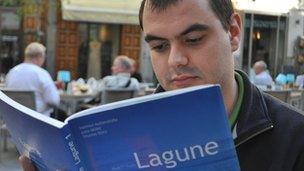
Sergio Munoz is 25 and has a degree in chemical engineering. He has been looking for work for the past nine months.
"If you go to an interview, there are another 1,000 people who want the same position as you. So if you want the job, you have to be the best of the best of the best.
"You have to be a God to find work in Spain," he says.
Sergio's plan is to move to Germany to try and find a job there. He has friends who have already moved to China and to Leeds, in the UK.
"I think young people think it is impossible to find a job right now."
Clara Ospina, Colombian wanting to leave Spain
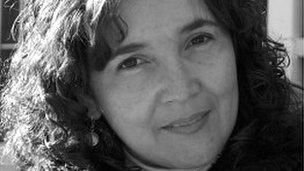
Clara Ospina, her husband and three children have been living in Spain for 12 years, and have been waiting to get their Spanish passports for the last two years. Her family is among the half a million people who are waiting for their citizenship applications to be processed by the authorities.
Last December, she and her husband - both psychologists - lost their jobs. They have been doing individual counselling and consultancy work to make ends meet. She says the only thing stopping her from leaving Spain has been waiting for her Spanish passport to come through. "My father is very ill in Colombia, and my children, like many Spanish youngsters, only see a future outside of this country," she says.
"Everybody says that when you get your [citizenship] documents, your life changes. But when you have them, life remains more or less the same. It is not as if a world of opportunities opens up to you.
"I would like to go back to Colombia. My husband would prefer to go somewhere else. And my children, who grew up in Spain, can only think of leaving Spain.
"For me, having a Spanish passport will be a triumph, although I don't think it will change things for me. My children are very stressed out. They have a different mentality: they only think of having a job contract, a stable job. There are other ways to earn a living, we learn that in our countries. We have been living through the economic crisis for the past 12 years, but I can say we are still standing."
- Published26 April 2013
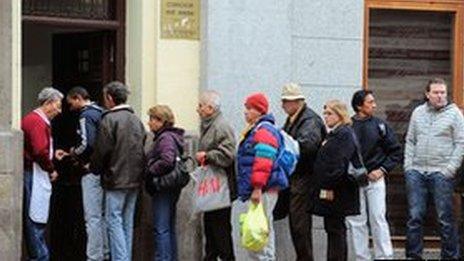
- Published21 August 2023
